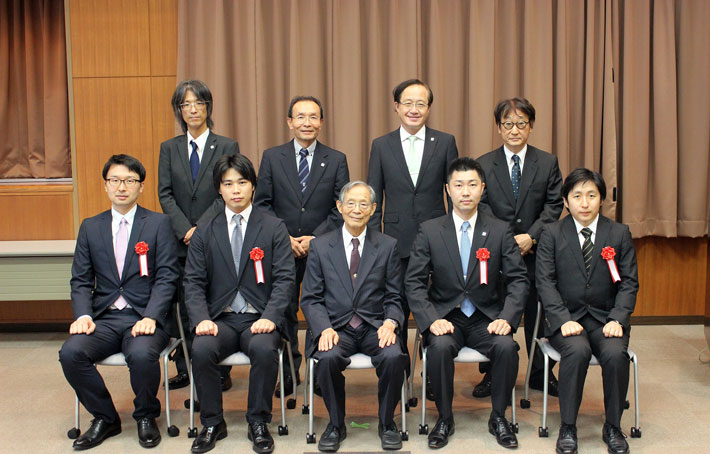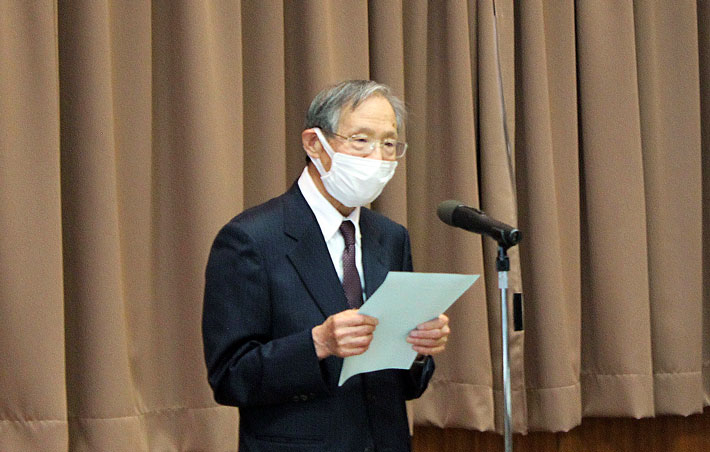Five researchers received the 2022 ASUNARO Grant, which is Tokyo Tech financial support for researchers under 45 years of age engaged in basic research. A ceremony to present the researchers with their award notices was held on June 16.

Memorial photo of the ceremony
The grant was established in FY 2020, in response to Professor Emeritus Koichi Asano’s wish to donate a portion of the proceeds from his research, saying, “I am grateful to society for the many years of support that allowed my work in basic research to flourish. In return, I would like to use the funds to support basic research by future generations.”
This is the second time the Institute has provided the grant for which 17 researchers applied and 5 were selected as recipients. At the ceremony to present the recipients with their award notices, President Kazuya Masu stated in a speech that he was looking forward to seeing the development of their research.
Professor Emeritus Asano also addressed the recipients, saying that when recipients feel they are up against the wall on all sides in their research, he hopes they will not give up and that they will try again one last time because, at such moments, it is often the case that they are just about to discover the solution to their problem. Following their speeches, recipients explained their research activities and then had a deep and active discussion with Professor Emeritus Asano, President Masu, Osamu Watanabe, Executive Vice President for Research, Shigeru Hioki, Vice President for Public Engagement.

Professor Emeritus Asano
Overview of the ASUNARO Grant
Objective
The Fund is designed to provide financial support to researchers engaged in fundamental science and engineering research, including steady research in mature engineering fields, engineering research that explores new possibilities based on a long-term perspective without being influenced by trends, and original engineering research for which it is difficult to acquire funding.
Eligibility
Associate Professor, Associate Professor(Lecturer), or Assistant Professor (excluding Specially Appointed Faculty) who is employed by Tokyo Tech and under 45 years of age as of April 1, 2022.
Research support period
As a general rule, the support period is 1 year from the day the research support begins. However, depending on the research plan, it is possible to apply for a 2-year period.
Amount of support
1,000,000 yen per research proposal
FY2022 Recipients of ASUNARO Grant
Associate professor / Department of Physics, School of Science
Assistant professor / Department of Physics, School of Science
Assistant professor / Department of Chemistry, School of Science
Assistant professor / Department of Chemistry, School of Science
Assistant professor / Department of Life Science and Technology, School of Life Science and Technology
Hiroaki ISHIZUKA
Associate professor / Department of Physics, School of Science
Research Topic: Theory of electron-phonon interaction in moire super-structures
Graphene is a semiconductor with extraordinary properties that attract interest in basic science and application. In addition, recent experiments found that the semiconductor turns into a superconductor (a material with zero resistivity) and ferromagnet by stacking a few layers of graphene in a certain manner. To understand the origin of the rich phases arising from stacking, we studied the electron-electron and electron-phonon interactions of the electrons. Our calculation shows that the interactions are strongly modified from the conventional form owing to the unique electronic state realized in this material. The predicted interaction reproduces the experimental observation, which contradicts conventional theories. The result suggests that the predicted modification of interaction occurs in the material, playing key roles in their electronic properties. This discovery potentially impacts the understanding of interaction effects observed in the stacked graphene, including ferromagnetism and superconductivity.







